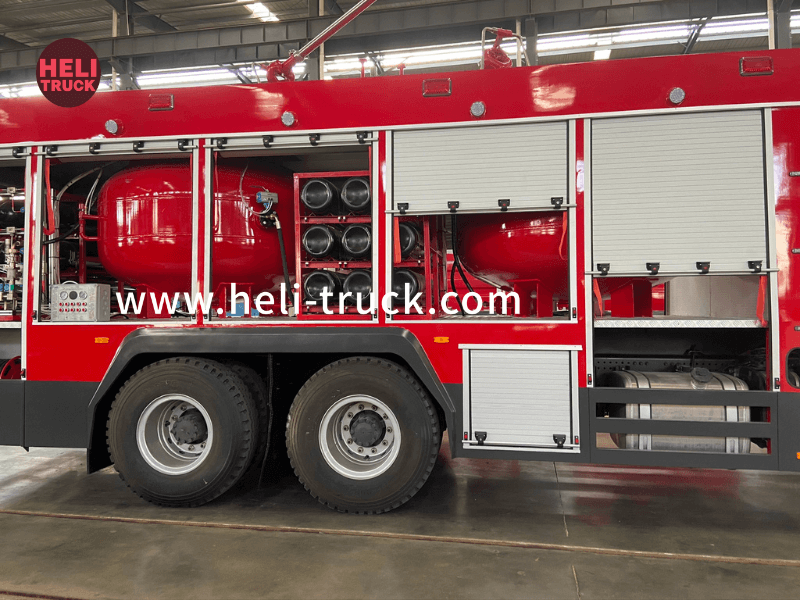Optimizing Garbage Truck Fleet Management for Improved Efficiency and Sustainability
Introduction: Garbage truck fleet management plays a crucial role in waste management systems, ensuring the timely and efficient collection of waste from households and businesses. As https://www.heli-truck.com/shacman-f3000-20000-liters-fuel-tanker-truck/ continue to grow and environmental concerns become more pressing, the need for optimized fleet management practices in the waste management sector has never been greater. In this article, we will explore the importance of garbage truck fleet management, the challenges faced in this sector, and strategies to enhance efficiency and sustainability. Importance of Garbage Truck Fleet Management: Garbage truck fleet management is essential for the smooth operation of waste collection services in cities and towns. A well-managed fleet ensures that waste is collected on time, reducing the risk of overflowing bins and environmental pollution. Efficient fleet management also helps to minimize operational costs, improve service quality, and reduce the carbon footprint of waste collection activities. Challenges in Garbage Truck Fleet Management: Despite its importance, garbage truck fleet management faces several challenges that can hinder the efficiency and sustainability of waste collection services. Some of the key challenges include: 1. Route Optimization: Planning efficient collection routes is crucial for minimizing fuel consumption, reducing travel time, and optimizing truck capacity. However, route optimization can be complex due to factors such as varying waste generation rates, traffic congestion, and road closures. 2. Vehicle Maintenance: Garbage trucks are subjected to heavy use and harsh operating conditions, leading to frequent breakdowns and maintenance issues. Poorly maintained vehicles can result in service disruptions, increased costs, and environmental pollution. 3. Data Management: Effective fleet management relies on accurate data collection and analysis to monitor vehicle performance, track service levels, and identify areas for improvement. However, many waste management companies struggle with data management due to outdated systems and lack of integration. 4. Environmental Impact: Garbage truck fleet operations have a significant environmental impact, including air and noise pollution, greenhouse gas emissions, and fuel consumption. Addressing these environmental concerns is crucial for promoting sustainability in waste management practices. Strategies for Optimizing Garbage Truck Fleet Management:  To overcome the challenges in garbage truck fleet management and improve efficiency and sustainability, waste management companies can adopt the following strategies: 1. Implement Route Optimization Software: Utilize advanced route optimization software to plan efficient collection routes based on real-time data, such as waste generation rates, traffic conditions, and truck capacity. This can help reduce fuel consumption, minimize travel time, and improve service quality. 2. Invest in Vehicle Maintenance Programs: Develop proactive vehicle maintenance programs to ensure that garbage trucks are regularly serviced and maintained in optimal condition. This can help prevent breakdowns, extend vehicle lifespan, and reduce repair costs. 3. Upgrade Data Management Systems: Invest in modern data management systems that enable real-time tracking of vehicle performance, service levels, and operational metrics. By analyzing data insights, waste management companies can identify inefficiencies and implement targeted improvements. 4. Adopt Green Technologies: Explore the use of alternative fuel vehicles, such as electric or compressed natural gas (CNG) trucks, to reduce greenhouse gas emissions and promote sustainability in fleet operations. Additionally, invest in noise-reducing technologies to minimize the environmental impact of garbage truck operations. 5. Collaborate with Stakeholders: Foster partnerships with local authorities, community organizations, and waste generators to enhance communication, gather feedback, and promote sustainable waste management practices. Engaging stakeholders can help build support for innovative fleet management initiatives and drive positive change. Conclusion: Garbage truck fleet management plays a critical role in waste management systems, ensuring the efficient and sustainable collection of waste from households and businesses. By addressing key challenges such as route optimization, vehicle maintenance, data management, and environmental impact, waste management companies can enhance the efficiency and sustainability of their fleet operations. Through the adoption of advanced technologies, proactive maintenance programs, and collaborative partnerships, the garbage truck fleet management sector can drive positive environmental outcomes and contribute to a cleaner, healthier future for urban communities.
To overcome the challenges in garbage truck fleet management and improve efficiency and sustainability, waste management companies can adopt the following strategies: 1. Implement Route Optimization Software: Utilize advanced route optimization software to plan efficient collection routes based on real-time data, such as waste generation rates, traffic conditions, and truck capacity. This can help reduce fuel consumption, minimize travel time, and improve service quality. 2. Invest in Vehicle Maintenance Programs: Develop proactive vehicle maintenance programs to ensure that garbage trucks are regularly serviced and maintained in optimal condition. This can help prevent breakdowns, extend vehicle lifespan, and reduce repair costs. 3. Upgrade Data Management Systems: Invest in modern data management systems that enable real-time tracking of vehicle performance, service levels, and operational metrics. By analyzing data insights, waste management companies can identify inefficiencies and implement targeted improvements. 4. Adopt Green Technologies: Explore the use of alternative fuel vehicles, such as electric or compressed natural gas (CNG) trucks, to reduce greenhouse gas emissions and promote sustainability in fleet operations. Additionally, invest in noise-reducing technologies to minimize the environmental impact of garbage truck operations. 5. Collaborate with Stakeholders: Foster partnerships with local authorities, community organizations, and waste generators to enhance communication, gather feedback, and promote sustainable waste management practices. Engaging stakeholders can help build support for innovative fleet management initiatives and drive positive change. Conclusion: Garbage truck fleet management plays a critical role in waste management systems, ensuring the efficient and sustainable collection of waste from households and businesses. By addressing key challenges such as route optimization, vehicle maintenance, data management, and environmental impact, waste management companies can enhance the efficiency and sustainability of their fleet operations. Through the adoption of advanced technologies, proactive maintenance programs, and collaborative partnerships, the garbage truck fleet management sector can drive positive environmental outcomes and contribute to a cleaner, healthier future for urban communities.